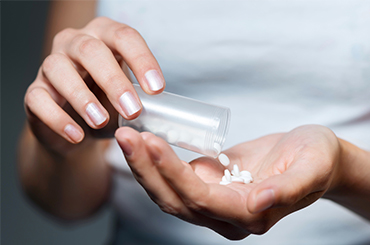- Be Honest With Your Doctor
- Enlist the Help of a Loving Monitor
- Look at Lifestyle Remedies
- Ask About Less Addictive Options
- Cycle Your Medications
- Sources
More than a quarter of Americans struggle with two or more chronic illnesses, and ongoing care for this group accounts for more than two-thirds of our nation's health care costs.Chronic Illness Statistics
Chronic illnesses can break the spirits of even the most resilient people. According to the National Health Council, 133 million Americans--almost half of the population--live with some form of chronic illness, like pain or cardiovascular problems.

You don't have to resign yourself to a life of addiction if you have a chronic health issue. Instead, try these strategies.
Be Honest With Your Doctor
People who live with chronic conditions, especially those who live with chronic pain, are accustomed to having their symptoms questioned by almost everyone--including their medical providers.

- Your journey to addiction-free wellness should begin with finding a doctor who believes you, listens to you, and who specializes in your unique cocktail of symptoms.
- Don't be afraid to ask lots of questions, and to keep looking until you find a doctor you trust.
Once you have the right medical provider, be honest about your addiction history, even if you are currently struggling with addiction.
- A doctor who understands your disease will be sympathetic even if he or she knows you struggle with addiction.
- Ask about best practices for managing your disease without igniting your addiction, and if you find yourself doubling up on pill doses or adopting other addictive behaviors, take the plunge and tell your doctor. You have nothing to be ashamed of.
Enlist the Help of a Loving Monitor
Even in the best of circumstances, prescription drugs don't always knock out all symptoms.
- A person with an anxiety disorder may still have waves of panic, even after she finds the right medication.
- A person with chronic pain may still find his pain flaring up at times of stress.
- When this happens, it's tempting to double your medication "just once," but you might soon find yourself taking many more pills than your doctor recommended.
Look at Lifestyle Remedies

No one wants to wait months for their symptoms to go away, but the truth is that many chronic illnesses can be managed--and in some cases, even cured--with lifestyle remedies. Consider asking your doctor to provide you with a short-term prescription as you work on cultivating a healthier lifestyle. This approach can help you move beyond your symptoms while offering you the psychological strength you need to combat your addiction.
Every condition is different, so ask your doctor which strategies are most likely to be effective for you. Some lifestyle remedies that tend to improve health in general, and that can combat a variety of chronic illnesses include:
Changing your diet:
- People with high blood pressure can benefit from a low-fat, low-sodium diet. Chronic pain often responds well to anti-inflammatory diets, while people with anxiety disorders sometimes find that eliminating caffeine and incorporating dietary supplements helps.
Getting plenty of exercise, especially of the aerobic variety:
- According to the Center for Disease Control (CDC), exercise improves mental health and sleep, reduces the risk of cancer, and can combat a number of chronic conditions.
Embracing meditation, which can quell unpleasant thoughts and help you more effectively control pain.
Getting more social interaction
- Strange though it may seem, the simple act of spending time with people you love can improve your health.
Improving your mental health through a combination of psychotherapy and lifestyle changes. A virtual avalanche of studies point to the power of therapy, social support, and other psychological support programs for reducing pain.
- One recent study published in the Archives of Physical Medicine and Rehabilitation, for instance, found that managing stress could virtually eliminate chronic pain in most patients.
Ask About Less Addictive Options
If you know you need medication to manage your condition, don't give up on getting better! Instead, ask your doctor if there is a less addictive option.
Cycle Your Medications
Depending upon your condition, you may be able to cycle between several different medications, thereby reducing the risk of chemical dependency. Some doctors also recommend taking a regular medication holiday from some drugs.
For instance, if you take Ritalin to manage ADHD, skipping pills when you don't have to concentrate at work or school can help your body adjust to life without drugs, thereby reducing your risk of abusing your medication.
Sources
About chronic diseases [PDF]. (2014, July 29). Washington, DC: National Health Council.
DEA should establish buy-back program for unused prescription drugs. (n.d.). Retrieved from http://www.drugfree.org/join-together/dea-should-establish-buy-back-program-for-unused-prescription-drugs-ny-senator/
International statistics. (n.d.). Retrieved from http://www.drugfreeworld.org/drugfacts/painkillers/international-statistics.html
Physical activity and health. (2015, June 04). Retrieved from http://www.cdc.gov/physicalactivity/basics/pa-health/
Rashbaum, I. G., & Sarno, J. E. (2003). Psychosomatic concepts in chronic pain. Archives of Physical Medicine and Rehabilitation, 84. doi:10.1053/apmr.2003.50144
Steiner, B. (2014, April 01). Treating chronic pain with meditation. Retrieved from http://www.theatlantic.com/health/archive/2014/04/treating-chronic-pain-with-meditation/284182/
Weiser, S., & Cedraschi, C. (1992). Psychosocial issues in the prevention of chronic low back pain--a literature review. Bailli?re's Clinical Rheumatology, 6(3), 657-684. doi:10.1016/s0950-3579(05)80132-3